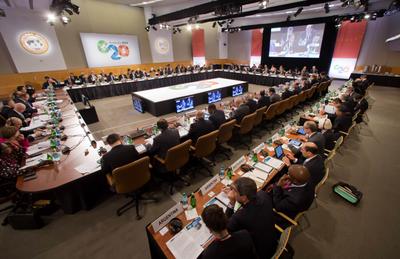The devolution of trade and investment discussions is prompted not only by frustration with the multilateral system but also by the needs of a dramatically changing trade structure. The existence of global value chains and a multipolar global economy changes the dynamics of trade and investment discussions. Moreover, a new set of concerns — ranging from food security to climate change — has emerged. These developments alone would pose significant challenges but, beyond that, there is a concern that even the more conservative assessments conclude that protectionism is on the rise.
The question is: what to do about it? The G20 needs to provide political leadership by defining and adopting a new global trade and investment regime that can respond to these challenges. The goal should be a free, fair, and open trade and investment regime that boosts growth, drives development and inclusiveness, and promotes sustainability. The principles, organisations, and processes within which trade and investment reform is motivated make up this global public good.
But instead of providing the requisite leadership, the G20 has been going in a different direction on trade. Repetitive references in G20 communiqués to completing the Doha round demonstrate that the G20 has no particular comparative advantage in negotiating specific trade measures. What is more, references to regional agreements and global value chains in the last two communiqués take the G20 in the wrong direction. They characterise the G20 as a forum for encouraging transparency and information exchange — all of which are welcome but are tasks that can be addressed in other fora, such as the OECD.
The proposal that the G20 deliver the public good of an improved global trade and investment regime fits well with its mandate and agenda. Since it assumed the mantle of leadership of the global economic and financial system in the midst of the global financial crisis, the G20 has focused on two areas: global growth and reform of global economic and financial architecture.
Trade and investment should be integral elements of both of these G20 priorities. Countries are encouraged to adopt unilateral measures in their trade and investment systems as part of their efforts in the comprehensive growth strategy. However, on the question of global economic and financial architecture, trade and investment have been kept to one side, especially in comparison to the focus on macroeconomic stability and the financial sector through the G20‘s major reform of the International Monetary Fund and the development banks.
What might a new architecture of the global trading system look like? One approach is a ‘multiple pathways’ framework: that is, a framework that recognises that multilateral objectives can be achieved by adopting best global practice while using a variety of paths including regional, sectoral, and plurilateral agreements.
ASEAN’s Regional Comprehensive Economic Partnership (RCEP) was designed with this multilateral best practice model in mind. RCEP spells out a set of principles to shape agreements under the partnership. The principles include open architecture norms, such as open accession, transparency, and best standards and practices.
The role and structure of a reformed World Trade Organization in the ‘multiple pathways’ framework must be assessed. A WTO with a new mandate could play a constructive role in supporting best-practice regional and other agreements.
Against this background, the G20’s medium-term goal should be to deliver the new architecture. G20 members could agree to observe a set of principles that ensure consistency with an overall multilateral vision. The principles would be adopted ultimately in a reformed WTO framework. These principles and the retooled WTO would be what the G20 could deliver in the medium term.
The immediate task is to get the G20 on the right track on trade and investment issues. To achieve this, the G20 must recognise that its strength — and therefore its focus — should be on establishing a new regime, rather than delivering specific policy measures within the existing one.
The Brisbane Leaders’ Communiqué would set out the goal of strengthening the global trade regime. Leaders could announce the appointment of an Eminent Persons Group (EPG) comprised of highly regarded people in international governance, trade and other areas, tasked to make recommendations on the global trade regime and specifically on the principles to be observed by G20 members and on the design of the new, reformed WTO.
The EPG would be a ‘peer group’ for G20 Leaders from whom they hear respected and independent reform advice reflecting a global perspective. To accomplish this goal, the G20 should appoint a working group of G20 officials — led by a G20 sherpa — tasked with preparing terms of reference for the EPG. The composition of the working group reflects the need to move trade discussions beyond a trade negotiation to reflect the broader economic ‘wins’ of a stronger regime.
The G20 is effectively the guardian of the global economic and financial architecture. The world needs a far more robust trade and investment system and so it is incumbent on the G20 to deliver the essential global public good of a new trade and investment regime.
Mari Pangestu is the Minister of Tourism and Creative Economy, Indonesia. She was the Minister of Trade of Indonesia from October 2004 to October 2011.
David Nellor is a Jakarta-based consultant.
This article appeared in the most recent edition of the East Asia Forum Quarterly, ‘The G20 summit at five’.

